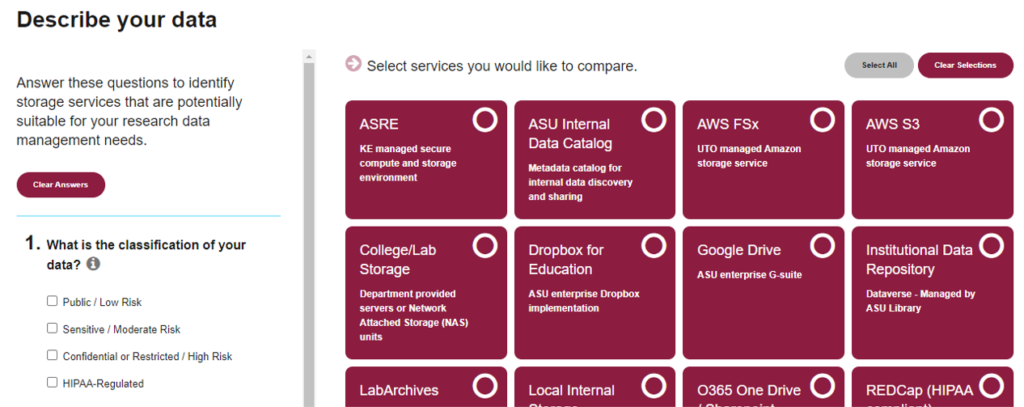Research data storage
Research data storage overview
Arizona State University has a large array of storage solutions available to research personnel. While these various storage mediums exist, the Research Technology Office recommends that all research projects choose storage solutions that provide the appropriate level of protection for the research data collected or created. This means that all data should be stored in a secure, resilient manner. Consequently, machine hard drives and USB drives should only be considered as temporary storage solutions, and only if the data is non-sensitive in nature. Long-term working storage should always be provided by a resilient storage solution provided by one of ASU’s cloud storage providers or Research Computing if the data needs to be held close to the point of compute.

Research involving sensitive data

Regulated research data
ASU has several standard data classifications. However, some research data that we collect regardless of data classification can be considered to be “regulated research data”. This is institutional information that ASU classifies as high-risk university data that is subject to legal or regulatory requirements and requires additional provisions to ensure it is adequately stored and protected. This usually includes additional controls and policies to restrict unauthorized or unapproved access to (or sharing of) the data. Regulated research data may include (but is not limited to):
- All human health data with links to the individual
- Identifiable human subject data (PII)
- Identifiable financial data (PFI)
- Export Administration Regulations (EAR)
- International Traffic in Arms Regulations (ITAR)
- Dark web
- National Security Defense data
- Some social media data
- Cybersecurity
- Data provided by a 3rd party via a data use agreement that has restrictions on use, possession, or access
Research data storage selector
The Research Storage Selector will help identify the most appropriate storage option for various types of research data. You may answer the questions and/or click on the preferred storage service(s). A review table at the bottom of the page will indicate if the preferred storage solution is suitable. While some storage options may appear to be acceptable, additional management controls will be needed to be considered approved by the Research Technology Office.

Research data storage FAQs
What is the direct storage replacement for the ITFS1 storage being decommissioned by the University Technology Office?
The direct, functional replacement for ITFS1 is the new AWS Fsx storage administered by the University Technology Office. Please contact the UTO for more information.
What options do I have if I only have general storage requirements, such as physical sciences, spatial/remotely sensed, life sciences (NOT human subjects research data and NOT personal identifiable information (PII) data)?
Several options exist for these types of data. You can consider storing your data on:
- Dropbox
- Google Drive
- One Drive (1 TB per person)
- For very large volumes of data Research Computing can provide project storage at $50 per terabyte per year.
What options do I have if my research collects human subjects research data that contains personally identifiable information (PII)) data?
There are multiple approved storage solutions for human subjects research data that contain PII. The Arizona Secure Research Environment (ASRE), AWS Fsx, and the REDCap HIPAA compliant solution are all suitable for human study research data. Use the Storage Selector to see which environment is the best fit for your research.
What do I do if I am not sure about the data I collect?
Please contact the Research Data Management Office and we will connect you to the proper individual/department who can assist with your data.